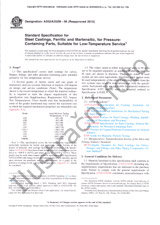Potřebujeme váš souhlas k využití jednotlivých dat, aby se vám mimo jiné mohly ukazovat informace týkající se vašich zájmů. Souhlas udělíte kliknutím na tlačítko „OK“.
ASTM D7862-21
Standard Specification for Butanol for Blending with Gasoline for Use as Automotive Spark-Ignition Engine Fuel
Přeložit název
NORMA vydána dne 1.4.2021
Informace o normě:
Označení normy: ASTM D7862-21
Datum vydání normy: 1.4.2021
Kód zboží: NS-1022193
Počet stran: 5
Přibližná hmotnost: 15 g (0.03 liber)
Země: Americká technická norma
Kategorie: Technické normy ASTM
Kategorie - podobné normy:
Anotace textu normy ASTM D7862-21 :
This specification covers butanol intended to be blended with gasoline at 1 to 12.5 volume % for use as an automotive spark-ignition engine fuel. It addresses performance requirements, workmanship, sampling, containers, sample handling, and test methods.
Keywords:
acidity, automotive spark-ignition engine fuel, base gasoline, bio-butanol, butanol, chloride ion content, corrosion inhibitors, fuel, gasoline, gasoline-butanol blend, impurities, oxygenate, solvent-washed gum, sulfate ion content, sulfur content, water content,, ICS Number Code 75.160.20 (Liquid fuels)
Doplňující informace
| 1. Scope | ||||||||||||||||||||||||||||||||||||||||
|
1.1?This specification covers butanol intended to be blended with gasoline at 1 % to 12.5 % by volume for use as an automotive spark-ignition engine fuel. 1.1.1?Butanol contains 22 % by mass oxygen. The mass percent of oxygen of a butanol blend with gasoline depends on the volume percent of butanol blended, the density of the butanol isomer, and the density of the base blendstock. 1.1.2?The maximum limit on blending is not a performance limit but a current regulatory limit in the United States. 1.2?This specification covers three butanol isomers: 1-butanol, 2-butanol, and 2-methyl-1-propanol. This specification specifically excludes 2-methyl-2-propanol (that is, tert-butyl alcohol). 1.2.1?Tert-butyl alcohol has different physical properties (melting point, water miscibility) than the other three isomers. 1.3?The values stated in SI units are to be regarded as standard. No other units of measurement are included in this standard. 1.4?This standard does not purport to address all of the safety concerns, if any, associated with its use. It is the responsibility of the user of this standard to establish appropriate safety, health, and environmental practices and determine the applicability of regulatory limitations prior to use. 1.5?This international standard was developed in accordance with internationally recognized principles on standardization established in the Decision on Principles for the Development of International Standards, Guides and Recommendations issued by the World Trade Organization Technical Barriers to Trade (TBT) Committee. |
||||||||||||||||||||||||||||||||||||||||
| 2. Referenced Documents | ||||||||||||||||||||||||||||||||||||||||
|




 Cookies
Cookies
